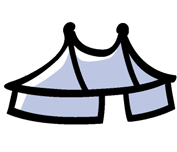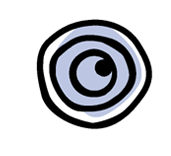Press release
"Tempus fugit? une ballade sur le chemin perdu"
The 30th anniversary show of the Cirque Plume, of the revival of circus.
For these 30 years of desire, joy, pain, life, we have created a festive show.
A show about time – for clockmakers, the "chemin perdu" is the space between what they call the drop and the lock, in other terms between the tick and the tock – transmission, history and meaning, the fun which is had moving backwards and forwards and in all directions, based on the idea that we make our own time, always and above all by sharing.
We are celebrating these years of freedom by mixing our repertoire with the culture and virtuosity of today’s performers.
In the infinite space of the eternity of the moment.
The ultimate definition of the circus experience.
(This show lasts 1:50 mins without an interval – not recommended for children under 5 years)

An attempt to explain the title (because sometimes people ask us and also so that nobody forgets the question mark when they write it, nor the double “L” in ballade…).
Tempus fugit
Can be pronounced as you want (even Latin speakers are uncertain): time flies.
In Latin, it is a common inscription on sundials, and also sometimes at the entrance to cemeteries.
In English it is a common theme in conversations among people over 23 years of age.
? question mark
In the circus world, the term "Tempus fugit" is uncertain: time in circus is immediate, that of the instant. Therefore, it is an eternal time.
Tempus fugit? Not at Cirque Plume!
A ballade
With a double L, because circus is a poem in acts. But, since the show is also a journey through the poem of representation, it would also have been possible to have given it three Ls. Une balllade sur le chemin perdu, that would have been quite something!
But it’s already complicated enough like that...
Sur le chemin perdu
The "chemin perdu" is a clock making term which, in an escapement system in a Comte clock, describes the space between the two lock and drop system between two anchors.
In clearer terms, the “chemin perdu” is the space between the tick and the tock.
It’s going to be comfortable there, between the rise and the fall, on “the chemin perdu”... in your company!
Thus, "Tempus Fugit ? une ballade sur le chemin perdu" is the title of this 10th show by the Cirque Plume.
(Kind of hard work!)
ABOUT THE SHOW…
I don’t know about you, but we’ve grown older.
And, it suits us: we are happy at all ages of our life (as children of the baby boom, we are the first generation to be able to enjoy this collective goal thanks to science and social solidarity).
The Cirque Plume was created by children of the blood-fuelled years of the 20th century, the post-war years, the suicide of a continent.
We were the silent youth of these horrors. The silence of our parents and of reconstruction weighed heavily on our shoulders.
We were children at the time of the crimes of decolonisation (more than 50 years since the 17 October 1961).
We were also the children on which the values and hopes of the National Council of the Resistance were based: working-class, socialist, Republican, Christian, progressive and independent education.
We were the youth who tried to invent different models.
Our desires were without limits. The time of hope corresponded to of our teenage years. Our dreams have since conformed to reality, but we have not forgotten them.
In light of this reality, at the start of the 1980s, we decided to create a circus in order to focus on these very same dreams.
Barbarianism had triumphed and ruled shortly before our birth, but we were looking for poetry, fragility, humility, responsibility, joy and shared experiences.
Out of absolute necessity.
We created shows which brought together all age groups and social classes for unlimited emotional experiences.
We proved that the cultural democratisation of live performances was possible through that which, in humans, is both unique to and shared by all individuals.
We are still amazed that we succeeded – for a while (and that’s what this project is all about) – in this challenge.
We chose circus arts for the artistic and magical treasures they offered us.
Also, we chose them for their cross-cutting nature, because the spectator’s sensitivity is more important than his academic and cultural knowledge. Circus arts were accessible to us also because they are less an object of social discrimination.
And, let’s be honest, at the time, circus was considered to be obsolete, dead, so we took advantage of the closing-down sales...
We created a form of circus which is open, inventive, profitable and non-commercial.
We produced some incredible shows.
30 years already and there’s more to come!
We are very aware of and greatly admire the talent and creative vivacity of the young members in our own troupe and in other troupes around the world.
From the outset, we have shared our history with that of the artists who have worked at our sides.
We make this shared experience the theme and the reality of "Tempus fugit ? une ballade sur le chemin perdu".
In the eternity of a somersault.
Bernard Kudlak
WHAT IS A CIRQUE PLUME SHOW ?
A circus show is a live show.
A Cirque Plume show is made by the living for the living;
It’s joyful, colourful, profound, poetic, messy, rough and ready, and precise. It’s like life.
It is nourished by the exchange that takes place between ... a lively bunch of people on the stage, launching into the air on ropes, doing somersaults on bikes, blowing on light beams, inventive in music, balancing on feathers ... and another bunch sitting in the audience, lively people too, launched on the wings of their hearts, breathtakingly together, inventing images, balancing on a frail poem which has sprung forth from time immemorial ever since primates endowed with articulated thumbs got together in a circle to sing, play, dance, and tell stories, showing their amazement at the gift of life while attempting to gain just a glimmering of insight into this mystery.
Our speciality is frailty, exchange, and this age-old yearning, this nostalgia for the ideal as Andrei Tarkovski put it.
The Circus is poetry in action. A poem to be shared.
The black box
"Why is there no ring?" We’ve been asked the same question so many times regarding the way we stage our show. It always comes as a surprise to see a circus under a big top using a theatrical performance space (just like in the music-hall): the black box.
The ring is in fact a circular space 13m in diameter, born out of the technical necessity for the distance required between a horse and the man who makes it perform. The audience sits round the ring. This is the most effective arrangement in order to achieve the maximum number of spectators sitting in a given space. It’s also the most ergonomic.
The frontal area in a big top is a waste of space. The black box is an extravagant artistic solution, but it works.
For me the words ‘black box’ conjure up a picture of a box whose lid is covered with a red-edged cloth, inside which there is a captured spider that one spies on from to time with a shiver of pleasure and fear.
In the theatre, circus, music hall and opera, contrary to its name the black box is in fact a box that is full of light, which sheds light.
The ‘black’ referred to in the black box is the darkness that is hiding something. The black of the stage curtain, with black being there to make us forget about darkness.
The black of absence is vital for presence, just as the air we breathe without thinking about it is vital for life.
The black box can be white, red, amber, crimson, turquoise or deep sea blue, purplish violet, whatever colour is created by light.
A box of light, a box that displays, a magic box, box of illusions, a box of delights, of happiness, pleasure, full of life for the audience and circus performers.
There are so many different ‘boxes’ and yet, just as they aren’t really black, neither are they really boxes. There’s no sense of enclosure.
The box, like the colour black, is merely a technicality used to help the spectator forget about it.
The space becomes infinite, miniscule or immense, it isn’t restricted to the confines of a box, a pair of curtains, but the limitless expanse of the imaginary world created on stage.
We have chosen this space for the possibilities it presents of creating an illusion, allowing the performers to look out at each member of the audience, for the flow of entrances and exits. For the ability to recreate a garden and a courtyard. For the lighting possibilities, grey areas around bodies for spectators who see them all from the same angle. Or almost.
We chose this performance space because we work with shadows and shadows are best observed against a backdrop or a silk screen.
We chose this performance space because it means we can have music that follows the movement on stage. This type of space means we can work with audio foldback, which in a circular space would be almost impossible.
Another reason we chose it is for the illusory effects we can create in the music hall tradition.
Bernard Kudlak








